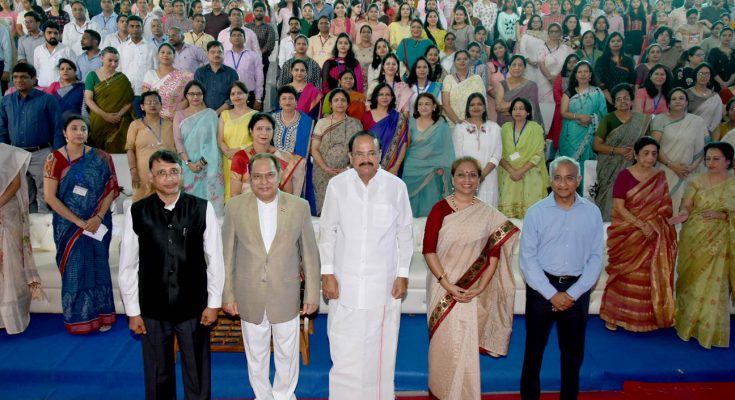Address by Shri M. Venkaiah Naidu, Honourable Vice President at the Diamond Jubilee Celebrations of Janki Devi Memorial College, in New Delhi on August 01, 2019.
“जानकी देवी स्मृति कॉलेज के संस्थापक दिवस के इस अविस्मरणीय अवसर पर आप सभी विद्यार्थियों, शिक्षकों, कॉलेज प्रशासन तथा गणमान्य अतिथियों के साथ सम्मिलित हो कर, इस कॉलेज के हीरक जयंती समारोह का उद्घाटन करते हुए, अत्यंत हर्ष का अनुभव कर रहा हूं।
मुझे यह जान कर प्रसन्नता है कि जानकी देवी स्मृति कॉलेज का उद्देश्य ही बालिकाओं को अच्छी शिक्षा प्रदान कर,उन्हें आर्थिक रूप से स्वावलंबी बनाना है जिससे वे समाज और वृहत्तर विश्व के उत्थान में सार्थक योगदान कर सकें।
इस महाविद्यालय के संस्थापक श्री बृज कृष्ण चंदीवाला जी, जिन्हें स्नेहपूर्वक भाई जी भी कहते थे, एक दूरदृष्टा थे।गांधीवादी विचारधारा से प्रभावित, यह उन्हीं की दृष्टि थी कि बेटियों को विशेषकर दुर्बल वर्ग की बेटियों को अच्छी शिक्षा प्रदान की जाए।
It gives me immense pleasure to participate in the Founder’s Day event and inaugurate the Diamond Jubilee Celebrations of Janki Devi Memorial College. It is a momentous occasion for the college, its students, faculty, management and all others involved in the running of this institution.
I am glad to learn that Janki Devi Memorial College aspires to provide quality education to young women, to empower them to be economically self-reliant and contribute meaningfully to progress of the society and the world at large.
The founder of the College, Shri Brij Krishan Chandiwala or Bhaiji, as he was fondly called, was a profound visionary. His vision to empower girls, especially from the marginalized sections of society, through quality education, reveals not just his deep commitment to Gandhian principles but also his foresight.
He chose the trading area close to Karol Bagh to set up a college for women because he felt that women from the trading class lacked access to quality education. He was convinced that education for the elite was easily accessible and the more daunting challenge was to provide quality, affordable education to the underprivileged and economically backward classes.
I am glad to know that, today, JDMC is one of the most prominent colleges of Delhi University. I am happy to learn that JDMC has excellent facilities that provide a holistic environment for its students to pursue academic and extra-curricular interests.
The students of this college, many of whom, I believe, come from humble backgrounds, have gone on to make their mark in various fields and contributed meaningfully to the nation.
The institution has, thus, succeeded in its mission of providing quality education to students for six decades.
मुझे विशेष प्रसन्नता है कि इस महाविद्यालय का महिला विकास केन्द्र, एनसीसी, एनएसएस, तथा गांधी स्टडी सर्किल सामाजिक, सामुदायिक मुद्दों जैसे कानूनी शिक्षा,महिला स्वास्थ्य और सशक्तिकरण, प्रौढ़ शिक्षा आदि पर छात्राओं को प्रशिक्षित करते हैं जिससे उनमें सामाजिक जागृति का विकास हो।
मुझे यह भी बताया गया है कि आर्थिक रूप से दुर्बल छात्रों की हर प्रकार से मदद करने के लिए महाविद्यालय में equal opportunity cell स्थापित किया गया है, जिसके तहत निःशुल्क भोजन भी उपलब्ध कराया जाता है। दिव्यांग छात्राओं की विशेष आवश्यकताओं को पूरा करने के लिए भी अनुकूल परिवेश उपलब्ध कराने के लिए मैं जानकी देवी मेमोरियल कॉलेज की सराहना करता हूं। सर्वसमावेशी शिक्षा प्रदान करने की दिशा में आपके निष्ठा पूर्ण प्रयास अभिनंदनीय और अनुकरणीय हैं।
पर्यावरण संरक्षण के लिए विशेष कार्यक्रम के माध्यम से पर्यावरण के प्रति जागरूकता पैदा की जा रही है। महाविद्यालय में स्थित जल संरक्षण प्रणाली की गणना सेंटर फॉर साइंस एंड एन्वायरमेंट द्वारा, दिल्ली के बेहतरीन उदाहरणों में की गई है। यह जरूरी है कि ऐसे प्रयासों के माध्यम से युवा विद्यार्थियों मैं पर्यावरण के प्रति जागरूकता बढ़ाई जाए।
I am glad to note that the Women’s Development Centre, National Cadet Corps (NCC), National Service Scheme (NSS) and the Gandhi Study Circle of the college provide an opportunity for students to engage with social issues like legal literacy, women’s health and empowerment and adult education.
I am told that the college has an Equal Opportunities Cell to support economically challenged students through several measures, including free meals. I also commend JDMC for creating a built environment that caters to the specific needs of the differently-abled students. I applaud your commitment towards inclusive education.
I also compliment the college for its culture of promoting eco-friendly initiatives through an active environment programme.
It is indeed noteworthy that the rain water harvesting system of the college has been rated as one of the best in Delhi by the Centre for Science and Environment. It is crucial that we instill an environmental consciousness in young people through such initiatives.
My dear sisters and brothers,
Education is a cause that is very close to my heart. In the two years that I have been in office, I have toured all over the nation meeting and interacting with students and educators.
According to Swami Vivekananda, “Education means that process by which character is formed, strength of mind is increased, and intellect is sharpened, as a result of which one can stand on one’s own feet”
Education is the foundation on which the progress of a nation depends. Today, India stands at the brink of a demographic dividend as 65% of its population is below 35 years. This is an unprecedented opportunity for the country to fast track development.
The only way to convert this dividend for achieving all-round and inclusive development of the nation is to provide good quality and affordable education to our young people.
Our schools and universities must be centres of excellence where knowledge is imparted, skills are honed, character is built, curiosity is inspired and morals are fortified. However, the need of the hour is to reorient our education system.
We simply cannot harbour an obsolete educational system that promotes mediocrity, rote learning, stifles creativity and pulls us backwards instead of propelling us forward into the future.
Our educational institutions must shun status quo and embrace change in accordance with the changing times. We have to constantly and objectively evaluate our curricula, teaching methodologies and research facilities. We need to keep updating and upgrading.
We must also realize that education does not, by itself make a person employable. Educational institutions must impart essential skills to students, including crucial life skills required for the knowledge-driven, interconnected world of the 21st century.
Schools and colleges must ensure that the children and youth of our country acquire the knowledge and skills that will enable them to become active contributors to building a new India and a new world.
They must ensure that the foundations are strong. What we need is the ability to observe and absorb, to assimilate and articulate, to ask questions and seek answers, to decipher and discover. It is also of paramount importance that our children must be equipped with a ‘moral compass’ to ensure that they never deviate from the righteous path.
The Kothari Commission observes that “the greatness of a country does not depend on the extent of its territory, the length of its communication or the amount of its wealth, but on the love for higher values of life. All must develop thought for the poor and suffering, regard and respect for women, faith in brotherhood regardless of race, colour, religion etc”.
Our educational institutions must promote equality and social justice and reduce social and cultural differences through the spread of knowledge.
We must also realize that in this age of scientific knowledge and technological advancement, there is no room for superstition and blind faith. Inculcating a scientific temper among children from a young age is of vital importance to spawn a culture of research and innovation in the country.
My dear young friends,
I have also been a strong of advocate of women’s empowerment and the need to educate the girl child.
I strongly believe that investing in women’s capabilities and empowering them are important for propelling economic growth and overall development. ‘Education for All’ has been a priority policy of successive governments. We have made significant strides in education in the seven decades since independence.
Our literacy rate which was 12% in 1947 grew to 74.04% in 2011.
Unfortunately, the gap between male and female literacy rate is considerable. According to the 2011 census, literacy rate for men was 82.14 % whereas for women it was 65.46 %.
Though this gap is narrowing, with more women becoming literate than men since 2011, we still have a long way to go.
As India aspires to be a 5 trillion-dollar economy and dreams of acquiring a position of leadership in the world, it simply cannot neglect the importance of education and the empowerment of the women.
Women constitute about 50 % of India’s human resource. The International Monitory Fund (IMF) recently estimated that raising women’s labour force participation to that of men can boost GDP by as much as 27 per cent in India. If 50% of skilled women could join the work force, India can scale its growth by 1.5 percentage points to 9 % a year. India needs its women to contribute to the work force.
Empowerment of women enables them to respond to the challenges, improve their status within the family and participate in the decision making. Today a happy family and a healthy and robust society cannot be sustained without the active participation of women.
The Government of the day too accords great priority to women empowerment. The Muslim Women (Protection of Rights on Marriage) Bill, 2019, passed in the Parliament the other day is aimed at securing gender rights and justice to women.
The passing of the bill is indeed a great moment in India’s legislative history. It is a major social reform bill that will go a long way in ensuring justice to Muslim women. I compliment all MPs for passing this crucial bill.
This was long overdue for a country that has taken great pride in its deep-rooted principles of democracy, secularism and equality.
Women’s literacy is more than just about economic opportunities. Increasing knowledge and awareness among women has a huge positive impact on the society. For example, literacy is directly related to health and infant mortality. Kerala has the highest female literacy rate and the lowest infant mortality whereas states like Bihar and UP with low female literacy have high infant mortality rates.
ये देखा गया है कि महिला शिक्षा का गरीबी उन्मूलन और स्थायी विकास पर अधिक गहरा और सकारात्मक प्रभाव पड़ता है।
मैं आशा करता हूं कि जानकी देवी मेमोरियल कॉलेज की तरह और भी संस्थान आगे आएं और हमारी बेटियां को गुणवत्तापूर्ण शिक्षा के अधिकाधिक अवसर उपलब्ध कराएं।
मैं एक बार पुनः जानकी देवी मेमोरियल कॉलेज को इस महत्वपूर्ण उपलब्धि के लिए बधाई देता हूं और आपके भावी प्रयासों की सफलता के लिए शुभकामनाएं देता हूं।
Women’s education has been found to have a more significant effect on lowering the poverty line and promotion of sustainable development.
Many more institutions such as the JDMC should come up and create avenues of education for our girl children.
I once again congratulate JDMC for achieving this coveted milestone. I wish each and every one of you the very best in your future endeavours.
Thank You!
Jai Hind!

